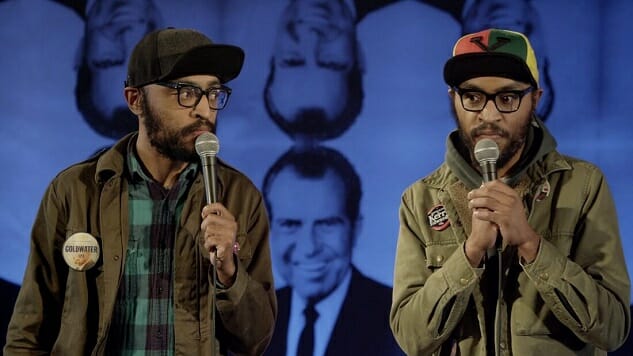The Hard Work of Being Chill: A Conversation with the Lucas Bros.
Photos courtesy of Netflix
At first glance, Kenny and Keith Lucas, aka the Lucas Bros, seem quintessentially chill. In fact, if “chill factor” existed on a scale, there’s little doubt which end they would occupy. Their laidback demeanor, wry delivery and sedate expressions all work together to suggest two guys who simply can’t be bothered. But in actuality being that chill takes a lot of work. “You gotta smoke a lot of weed,” Kenny laughs. “You gotta see a therapist. It’s the combination of the two.” And, it turns out, read a great deal of philosophy. Kenny’s favorite philosopher happens to be John Stuart Mill, while Keith reveals a preference for Bertrand Russell. “We’re currently reading A History of Western Philosophy, and he examines things in such a dialectical way,” says Keith. Reading Russell’s tome might sound like a heavy (and heady) task for two comedians who crack wise about Space Jam and Bret “The Hitman” Hart in between their more meditative moments about the criminal justice system, but the philosophy they studied in college has stuck with them.
The title of their new Netflix special, Lucas Bros: On Drugs, declares the very factor that goes into their easygoing dispositions, but it’s a clever play on intent. Lucas Bros: On Drugs ruminates on that very topic and on the particular war the U.S. has waged against it since Richard Nixon’s presidency. From his declaration followed innumerable adverse effects that impacted minority communities and helped create the prison industrial complex we have today. The brothers touch on this fact, but from their philosophically-inclined stance consider other perspectives as well. Would we have gotten the Notorious B.I.G. without the challenges the war on drugs presented? “You can focus on the negatives of the war on drugs—and there have been plenty—but you can also look at it from another perspective,” Keith says. “There’s always a different side to a particular issue, and I think we wanted to present different sides just to show that you can make arguments on any level.”
In examining both sides to an argument, the two harken back to their days in law school. They attended before dropping out to pursue comedy, but they didn’t toss aside their interest in logic and reasoning when switching career paths. “Jokes are just a disruption of logic,” Keith says. Kenny takes their explanation one step further. “A joke is basically syllogistic,” he states, referencing the form of reasoning that goes: All dogs are animals, all animals have four legs, therefore all dogs have four legs. “Its premise and then the punchline would be conclusion. It’s the same shit.”
-

-

-

-

-

-

-

-

-

-

-

-

-

-

-

-

-

-

-

-

-

-

-

-

-

-

-

-

-

-

-

-

-

-

-

-

-

-

-

-








































